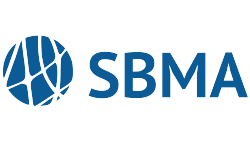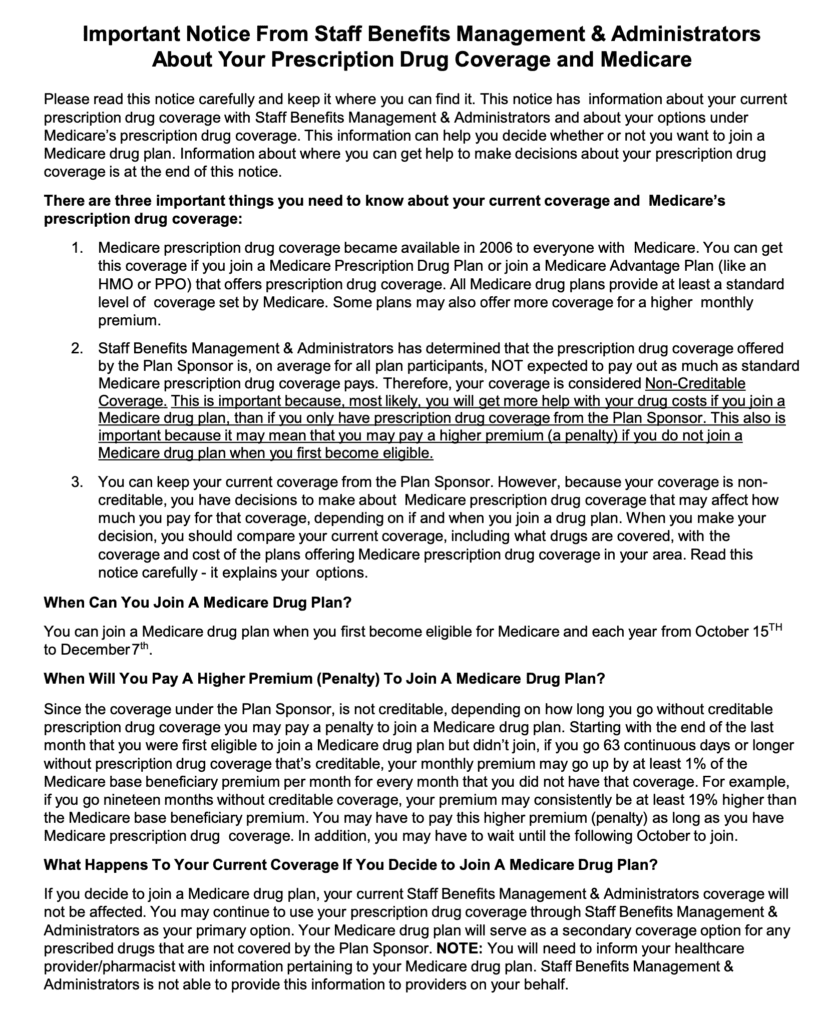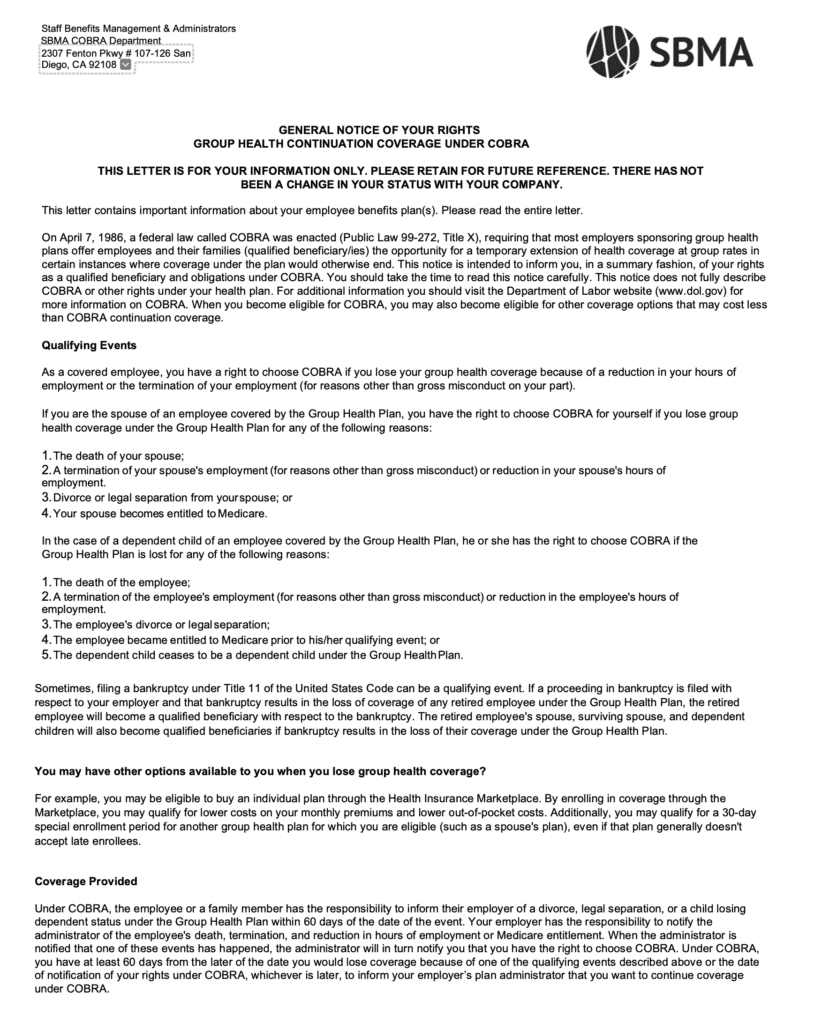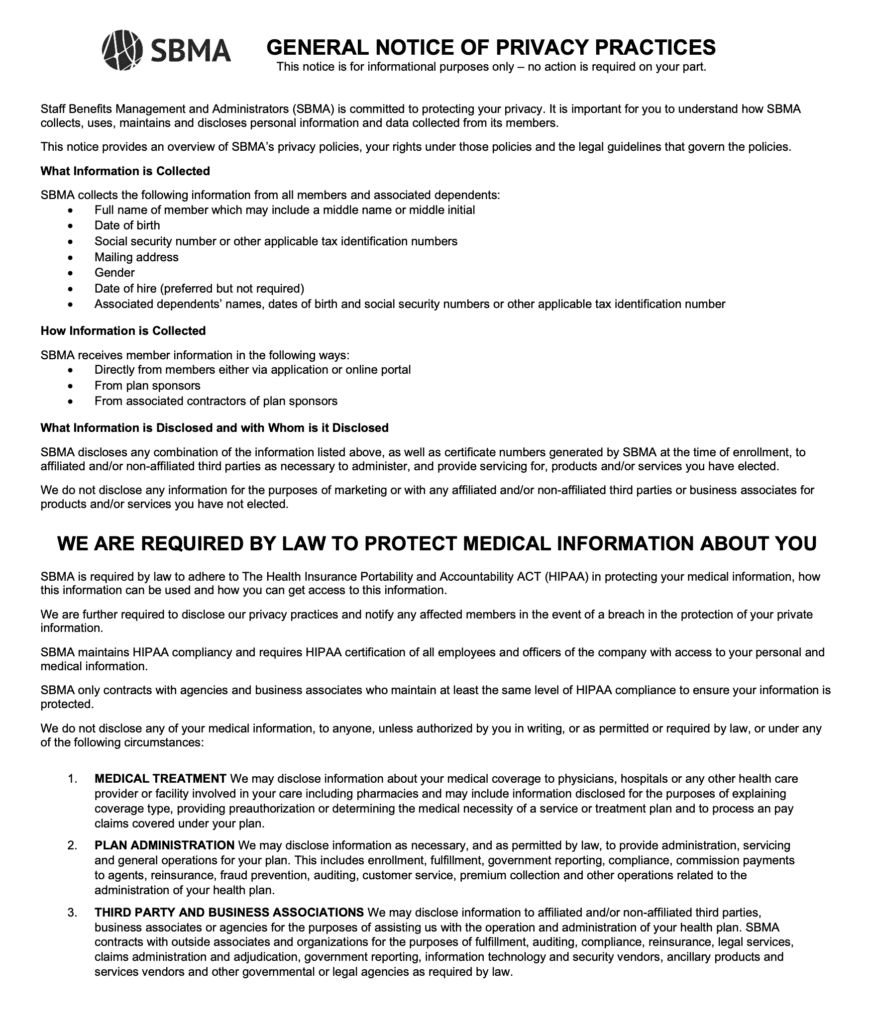GENERAL NOTICE OF YOUR RIGHTS
GROUP HEALTH CONTINUATION COVERAGE UNDER COBRA
THIS LETTER IS FOR YOUR INFORMATION ONLY. PLEASE RETAIN FOR FUTURE REFERENCE. THERE HAS NOT BEEN A CHANGE IN YOUR STATUS WITH YOUR COMPANY.
This letter contains important information about your employee benefits plan(s). Please read the entire letter.
On April 7, 1986, a federal law called COBRA was enacted (Public Law 99-272, Title X), requiring that most employers sponsoring group health plans offer employees and their families (qualified beneficiary/ies) the opportunity for a temporary extension of health coverage at group rates in certain instances where coverage under the plan would otherwise end. This notice is intended to inform you, in a summary fashion, of your rights as a qualified beneficiary and obligations under COBRA. You should take the time to read this notice carefully. This notice does not fully describe COBRA or other rights under your health plan. For additional information you should visit the Department of Labor website (www.dol.gov) for more information on COBRA. When you become eligible for COBRA, you may also become eligible for other coverage options that may cost less than COBRA continuation coverage.
Qualifying Events
As a covered employee, you have a right to choose COBRA if you lose your group health coverage because of a reduction in your hours of employment or the termination of your employment (for reasons other than gross misconduct on your part).
If you are the spouse of an employee covered by the Group Health Plan, you have the right to choose COBRA for yourself if you lose group health coverage under the Group Health Plan for any of the following reasons:
- The death of your spouse;
- A termination of your spouse’s employment (for reasons other than gross misconduct) or reduction in your spouse’s hours of
- Divorce or legal separation from your spouse; or
- Your spouse becomes entitled to
In the case of a dependent child of an employee covered by the Group Health Plan, he or she has the right to choose COBRA if the Group Health Plan is lost for any of the following reasons:
- The death of the employee;
- A termination of the employee’s employment (for reasons other than gross misconduct) or reduction in the employee’s hours of
- The employee’s divorce or legal separation;
- The employee became entitled to Medicare prior to his/her qualifying event; or
- The dependent child ceases to be a dependent child under the Group Health
Sometimes, filing a bankruptcy under Title 11 of the United States Code can be a qualifying event. If a proceeding in bankruptcy is filed with respect to your employer and that bankruptcy results in the loss of coverage of any retired employee under the Group Health Plan, the retired employee will become a qualified beneficiary with respect to the bankruptcy. The retired employee’s spouse, surviving spouse, and dependent children will also become qualified beneficiaries if bankruptcy results in the loss of their coverage under the Group Health Plan.
You may have other options available to you when you lose group health coverage?
For example, you may be eligible to buy an individual plan through the Health Insurance Marketplace. By enrolling in coverage through the Marketplace, you may qualify for lower costs on your monthly premiums and lower out-of-pocket costs. Additionally, you may qualify for a 30-day special enrollment period for another group health plan for which you are eligible (such as a spouse’s plan), even if that plan generally doesn’t accept late enrollees.
Coverage Provided
Under COBRA, the employee or a family member has the responsibility to inform their employer of a divorce, legal separation, or a child losing dependent status under the Group Health Plan within 60 days of the date of the event. Your employer has the responsibility to notify the administrator of the employee’s death, termination, and reduction in hours of employment or Medicare entitlement. When the administrator is notified that one of these events has happened, the administrator will in turn notify you that you have the right to choose COBRA. Under COBRA, you have at least 60 days from the later of the date you would lose coverage because of one of the qualifying events described above or the date of notification of your rights under COBRA, whichever is later, to inform your employer’s plan administrator that you want to continue coverage under COBRA.
If you elect COBRA, your employer is required to give you and your covered dependents, if any, coverage that is identical to the coverage provided under the plan to similarly situated employees or family members. Under COBRA, you may have to pay all or part of the premium for your continuation coverage. If you do not choose COBRA on a timely basis, your group health insurance coverage will end.
Period of Coverage
COBRA continuation coverage is a temporary continuation of coverage that generally lasts for 18 months due to employment termination or reduction of hours of work. Certain qualifying events, or a second qualifying event during the initial period of coverage, may permit a beneficiary to receive a maximum of 36 months of coverage.
COBRA requires that you be afforded the opportunity to maintain coverage for 36 months unless you lost group health coverage because of a termination of employment or reduction in hours. In that case, the required COBRA period is 18 months. Also, if you or your spouse gives birth to or adopts a child while on COBRA, you will be allowed to change your coverage status to include the child. The 18-month period may be extended to 29 months if an individual is determined by the Social Security Administration (SSA) to be disabled (for Social Security purposes) as of the termination or reduction in hours of employment or within 60 days thereafter. To benefit from this extension, a qualified beneficiary must notify their employer’s plan administrator of that determination within 60 days and before the end of the original 18-month period. The affected individual must also notify their employer’s plan administrator within 30 days of any final determination that the individual is no longer disabled. If the original event causing the loss of coverage was a termination (other than for gross misconduct) or a reduction in hours, another extension of the 18-month continuation period may occur, if during the 18 months of COBRA coverage, a qualified beneficiary experiences certain secondary qualifying events:
- Divorce or legal separation
- Death
- Medicare entitlement
- Dependent child ceasing to be a dependent
If a second qualifying event does take place, COBRA provides that the qualified beneficiary may be eligible to extend COBRA up to 36 months from the date of the original qualifying event. If a second qualifying event occurs, it is the qualified beneficiary’s responsibility to inform their employer’s plan administrator within 60 days of the event. In no event, however, will COBRA last beyond three years from the date of the event that originally made the qualified beneficiary eligible for COBRA.
Alternate Recipients Under QMCSOs
A child of the covered employee who is receiving benefits under the Plan pursuant to a qualified medical child support order (QMCSO) received by their employer during the covered employee’s period of employment with their employer is entitled to the same rights to elect COBRA as an eligible dependent child of the covered employee.
Are there other coverage options besides COBRA Continuation Coverage
Yes. Instead of enrolling in COBRA continuation coverage, there may be other coverage options for you and your family through the Health Insurance Marketplace, Medicaid, or other group health plan coverage options (such as a spouse’s plan) through what is called a “special enrollment period.” Some of these options may cost less than COBRA continuation coverage. You can learn more about many of these options at www.healthcare.gov.
Plan Contact Information
Questions concerning your Plan, or your COBRA continuation coverage rights, should be addressed to the contact or contacts identified below. For more information about your rights under the Employee Retirement Income Security Act (ERISA), including COBRA, the Patient Protection and Affordable Care Act, and other laws affecting group health plans, contact the nearest Regional or District Office of the U.S. Department of Labor’s Employee Benefits Security Administration (EBSA) in your area or visit www.dol.gov/ebsa. (Addresses and phone numbers of Regional and District EBSA Offices are available through EBSA’s website.) For more information about the Marketplace, visit www.HealthCare.gov.
To ensure that all covered individuals receive information properly and timely, it is important that you notify our Customer Service Department at (888) 505-7724 of any change in dependent status or any address change of any family member as soon as possible. Certain changes must be submitted to us in writing. Failure on your part to notify us of any changes may result in delayed notification or loss of continuation of coverage options.
If you have any questions about COBRA, please contact our Customer Service Department at (888) 505-7724 during business hours.



